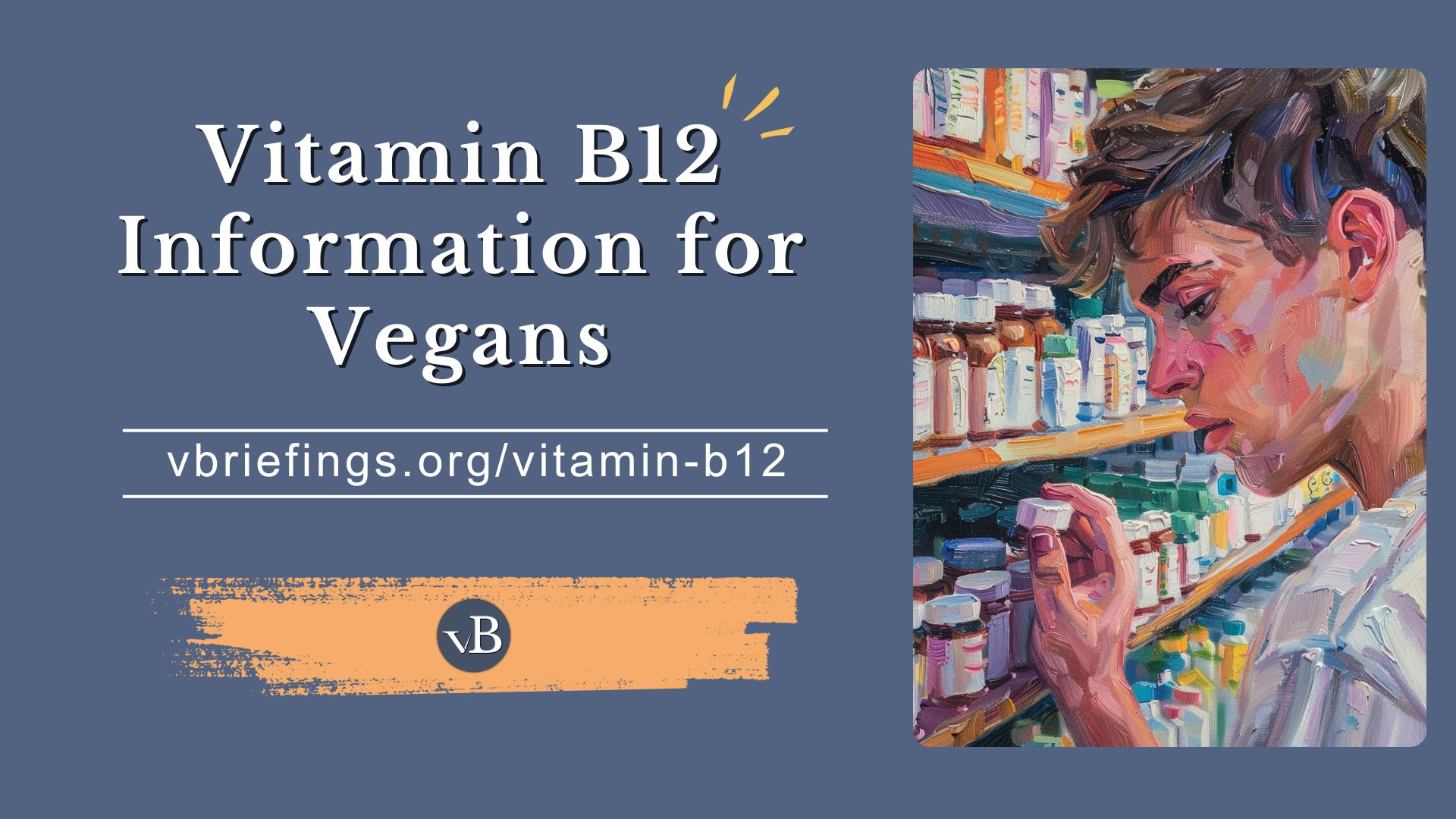Preface
Briefing description and more.
We address several aspects of Vitamin B12 for those on a vegan diet, including cost, supplementation, and the claim that B12 proves a vegan diet is not natural.
Companion Videos
How to use companion videos
Videos may be posted on multiple social media platforms, and you can share them on each platform according each platform’s conventions.
Share this Briefing
Social Media Sharing Image
This image will be used when sharing the briefing on a social media platform. You can see all social sharing images in the grid view.

How to share this briefing
Click on the icon for the platform on which you wish to share. What happens next depends on the platform, but generally a popup will appear, letting you add your own text as you share.
Briefing Meta
Metrics
Note: we will publish additional briefings after completing flashcards and presentation slides for selected briefings.
Counts:
| Main Text | |
| Key Points | 6 |
| Counterclaims | 1 |
| Supplementary | 4 |
| Further Study | 2 |
| Footnotes | 26 |
| Media & Advocacy | |
| Advocacy Notes | 7 |
| —Socratic Questions | 7 |
| Flashcards | 0 |
| Presentation Slides | 0 |
| Memes & Infographics | 0 |
| Companion Videos | 0 |
Other Meta:
Date Posted:
Last Edited:
Edit Log:
Key Points Links
Loading…
Help Us Improve
Please send your suggestions for improvements, or report any issues with this briefing to team@vbriefings.org
We appreciate that you are taking the time to help up improve. All suggestions and reports will be carefully considered.
Summary
A concise summary of the briefing (see below for citations).
Vitamin B12, virtually absent from plant foods, is essential for preventing anemia and nerve damage, making supplementation important for vegans. Affordable and widely available, B12 supplements are a reliable choice over relying solely on fortified foods. While critics argue that the need for supplementation makes veganism unnatural, this reflects the naturalistic fallacy—the flawed idea that what is natural is inherently better.
Context
Places this topic in its larger context.
B12 is an important topic for vegans, as this critical nutrient is perhaps the only nutrient for which there seems to be universal agreement that vegans need to supplement.
To put the problem of B12 for vegans in its larger context, nutrient deficiencies are a common concern and not just a concern for vegans.
- According to the US Office of Disease Prevention and Health Promotion (ODPHP), Americans are commonly deficient in 9 nutrients. These are vitamin A, vitamin C, vitamin D, vitamin E, folate, calcium, magnesium, potassium, and fiber. In addition, iron is a common deficiency in adolescent and premenopausal females.1
- In order to overcome the nutrient deficiencies commonly experienced by Americans, the US Office of Disease Prevention and Health Promotion (ODPHP) recommendation is to adopt a USDA healthy eating pattern2 such as a vegan diet (the vegetarian healthy eating pattern explicitly allows for a fully vegan diet).3
Key Points
This section provides talking points.
B12 supplementation is recommended for vegans.
“People who follow a vegetarian or vegan diet might be prone to deficiency because plant foods don’t contain vitamin B-12″ (Mayo Clinic).4
“A vitamin B-12 deficiency can lead to anemia, fatigue, muscle weakness, intestinal problems, nerve damage and mood disturbances” (Mayo Clinic).
According to Registered Dietitian Jack Norris, “the overwhelming consensus in the mainstream nutrition community and among vegan health professionals is that B12 supplementation is necessary for the optimal health of vegans. The good news is that vegans who supplement with B12 often have a superior B12 status to meat-eaters.”5
B12 supplementation is inexpensive.
It costs under 25 cents a week to buy B12 supplements—a small price to pay to avoid harming animals—and to reap the health benefits and other positive consequences of veganism.6
The “25 cents a week” figure for B12 supplementation is based on Nature Made brand B12,7 sold at Walmart and other stores, in the biweekly dosage recommendation by Dietitian Jack Norris.8
The recommended amount of supplementation varies with frequency.
“The recommended daily amount of vitamin B-12 for adults is 2.4 micrograms.” (Mayo Clinic)9 Recommendations for supplementation are much higher because absorbency rates vary among individuals.
For daily supplementation, Dietitian Jack Norris (among others) recommends about 5–100 micrograms of B12 in the form of cyanocobalamin, depending on age and other factors.10
For biweekly supplementation, Dietitian Jack Norris (among others) recommends 500-1,000 micrograms twice a week in the form of cyanocobalamin.11
The optimum amount of B12 supplementation can vary among individuals. Please check with your doctor to help determine your optimum amount.
Some vegans may be able to get enough B12 through fortified foods, but it’s risky.
According to Registered Dietitian Brenda Davis, you could also get adequate B12 through fortified foods by consuming three servings of B12-fortified foods daily, with each serving supplying at least two micrograms. Nondairy milk, breakfast cereals and bars, vegan meat substitutes, and nutritional yeast are commonly fortified with B12.12
Getting B12 supplementation through fortified foods requires more diligence and planning than supplementation.13
The need for B12 supplements may be a consequence of modern living.
Several health practitioners have speculated that before our modern way of life, we would have gotten adequate B12 from soil microbes and drinking water from streams. Unlike in previous times, our fruits, vegetables, and root crops are likely now grown in more sterile soil and more thoroughly washed, eliminating the B12 that might otherwise be present in the food.14 15 16 17 18
B12 deficiency is not just a vegan problem.
It is not unusual for people across all diets to be deficient in vitamin B12, not just vegans. This issue affects a wide range of individuals, including those who consume animal products. The risk is higher for those who are pregnant and have certain conditions like alcohol abuse, pernicious anemia, digestive illnesses, and immune disorders.19
Counterclaims
Responses to some yes but retorts.
Claim: A vegan diet is not natural because vegans need to supplement with B12.
- The claim that a vegan diet is not natural is an example of the naturalistic fallacy.20 That is to say, being natural doesn’t make something ethically or nutritionally sound. Hemlock is natural, but not recommended for consumption.
- If a vegan diet is unnatural because of a need for B12 supplementation, then perhaps being over fifty years old is unnatural, because those over fifty are commonly deficient in B12, and supplementation is recommended for anyone over fifty (National Academy of Medicine).21
Supplementary Info
Additional information that may prove useful.
B12 is produced by microorganisms in the soil and in the intestines of animals (including our own),22 but the B12 produced in our bodies is not adequate to prevent deficiency, so supplementation is advised for vegans.23
According to Dietitian Brenda Davis, “animal products are unreliable B12 sources in people older than 50…”24
B12 can be found naturally in a few non-animal sources, including mushrooms and seaweed; trace amounts can be found in broccoli, asparagus, mung bean sprouts, and other vegetables.25
The Framington Study published in the American Journal of Clinical Nutrition (a prospective study with 5135 participants) found that there was no difference in B12 levels between those who ate meat, poultry, or fish and those who did not eat those foods.26
- Although the Farmington Study did not separately study B12 levels for those who consume dairy products, it should be noted that most plant milks are fortified with B12.27
Further Study
Sources providing a deeper understanding of the topic or related topics.
Other Resources
Article: Vitamin B12, Vegan Health, Jack Norris RD. This is a comprehensive resource regarding B12 nutrition for vegans.
Video: What You Need To Know About Vitamin B12 | Vegan Diets. Neal Barnard, Physicians Committee
Advocacy Resources
Information to help with outreach and advocacy.
Note: we will publish additional briefings after completing flashcards and presentation slides for selected briefings.
Share This Briefing
Cloned from the Preface Section on page load.
Companion Videos
Cloned from the Preface Section on page load.
Memes and Infographics
No images found.
How to use Memes and Infographics
To sequence through all memes and infographics on this page, click on any image than use the arrow keys or the arrow buttons to show next and previous images.
To share a meme or infographic, right click on the image and choose download or save as. Then upload the image to the platform of choice.
Presentation Slides
Slides not available.
How to Use the Presentation Slides
You can view the slideshow full screen by clicking on the first link above.
To use Canva presenter mode, view the speaker notes, or download the slides as PowerPoint, login to Canva (the free account works) and follow the Full Canva Link provided above.
To copy this presentation to your own Canva project, use the Full Canva Link provided above, then select File->Make a Copy from the upper left. You can build your own unique presentation from multiple briefings by copying the presentation from each briefing and then building another presentation from the copied presentations.
Flash Cards
We partner with Brainscape because of their excellent features for learning. You will need to create a free Brainscape account to study the cards.
Go to Flash Cards: This will take you to a list of decks.
About Flash Cards and Brainscape
Flash cards are here to help you commit important facts and concepts in this briefing to memory.
In Brainscape, there is one deck for each briefing. You can study more than one deck at a time. Brainscape uses spaced repetition to promote memory retention. It is “the secret to learning more while studying less.”
You can study using your browser, but Brainscape also has a free mobile app that makes learning anywhere easy.
Socratic Questions
Socratic-style questions are embedded in the Advocacy Notes below, and shown in italics.
These are open-ended, thought-provoking questions designed to encourage critical thinking, self-reflection, and deeper understanding. They are inspired by the Socratic method, a teaching technique attributed to the ancient Greek philosopher Socrates, who would ask his students probing questions rather than directly providing answers.
The goal is to help people examine their beliefs, clarify their thoughts, uncover assumptions, and explore the evidence and reasoning behind their ideas.
Advocacy Notes
Tips for Advocacy and Outreach
General Tips
Do not argue that B12 is not produced by animals but by bacteria.
- One could argue that because B12 is synthesized in the intestines of animals, it is produced by animals (B12 is also produced in the soil).
Do not argue that bovines are supplemented with B12, so that’s where omnivores get their B12.
- It’s true that some bovines are supplemented with B12 in some circumstances, but the author cannot verify that it’s a common practice, and even if it is a common practice, that’s where the B12 in bovine flesh originates. It’s complex.
Segue the Conversation Back to Animal Ethics
- “A B12 supplement costs less than 25 cents a week. Do you think that’s too much to pay to avoid harming animals and get all the benefits of a vegan diet?”
Why? It’s good to get back to animal ethics as soon as possible.
Address the “Vegan Diets Are Unnatural” Argument
Some people argue that if a diet requires supplements, it must be unnatural. Challenge this assumption and show why it’s flawed.
- “Many people over 50 are advised to take B12 supplements because absorption decreases with age. Would you say aging is unnatural?”
Why? This reveals that needing a supplement doesn’t make something unnatural or unhealthy.
Use Comparisons to Show That B12 Is Not a Vegan Issue
People may assume B12 deficiency only affects vegans, but many non-vegans also don’t get enough B12. Show them the bigger picture.
- “The U.S. government reports that many Americans—vegan and non-vegan—are deficient in key nutrients. Should we dismiss all diets because of this?”
- “The Framingham Study found no significant difference in B12 levels between meat-eaters and non-meat-eaters. So if a diet needs B12 supplementation, why not address it for everyone?”
Why? This shifts the focus from veganism to the fact that nutrient deficiencies exist in all diets.
Leave Them With a Thought-Provoking Question
If they’re still skeptical, don’t argue—just give them something to think about.
- “If a single, cheap supplement solves the B12 issue, is that really a good reason to avoid veganism?”
- “If farmed animals get B12 supplements, why not just take the supplement directly?”
Why? This encourages them to rethink their objections without feeling pressured.
Show That B12 Deficiency Is a General Health Issue, Not a Vegan One
Many people use B12 as a “gotcha” against veganism, assuming it proves the diet is unnatural or unsafe.
- “If B12 deficiency is common among people who eat animal products too, doesn’t that show it’s a broader health issue rather than just a vegan concern?”
- “If B12 levels can drop for people across all diets, wouldn’t it make more sense to focus on awareness and supplementation rather than blame veganism?”
Why? This reframes the B12 objection as a shared health challenge, defusing its power as a vegan-specific criticism.
Footnotes
Our sources, with links back to where they are used.
- “Scientific Report of the 2015 Dietary Guidelines Advisory Committee, Part D Chapter 1.” Health.gov ODPHP, 2015. ↩︎
- “Scientific Report of the 2015 Dietary Guidelines Advisory Committee, Part D Chapter 1.” Health.gov ODPHP, 2015. ↩︎
- “USDA Food Patterns: Healthy Vegetarian Eating Pattern.” Dietary Guidelines for Americans, Eighth Edition. ↩︎
- Vitamin B12, Mayo Clinic, July 17, 2021 ↩︎
- Norris, Jack . “Vitamin B12.” Vweb.archive.org/web/20240517231351/https://veganhealth.org/vitamin-b12/ ↩︎
- The “25 cents a week” figure for B12 supplementation is based on “Nature Made Vitamin B-12 Dietary Supplement Timed Release Tablets, 1000mcg, 190 Count.” Walmart.com. Accessed January 30, 2018. ↩︎
- “Nature Made Vitamin B-12 Dietary Supplement Timed Release Tablets, 1000mcg, 190 Count.” Walmart.com. Accessed January 30, 2018. ↩︎
- Norris, Jack. “Daily Needs.” Vegan Health. ↩︎
- Vitamin B12, Mayo Clinic, July 17, 2021 ↩︎
- Norris, Jack. “Daily Needs.” Vegan Health. ↩︎
- Norris, Jack. “Daily Needs.” Vegan Health. ↩︎
- Davis, Brenda, and Vesanto Melina. Becoming Vegan: The Complete Reference to Plant-Based Nutrition. Com edition. Book Pub Co, 2014. 221 ↩︎
- Davis, Brenda, and Vesanto Melina. Becoming Vegan: The Complete Reference to Plant-Based Nutrition. Com edition. Book Pub Co, 2014. 221 ↩︎
- Klaper, Dr. Michael. “Vitamin B12 Basics.” Michael Klaper, M.D., Nutrition-Based Medicine, January 27, 2017. ↩︎
- Campbell, T. Colin, and Thomas M Campbell. The China Study: The Most Comprehensive Study of Nutrition Ever Conducted and the Startling Implications for Diet, Weight Loss and Long-Term Health. 1 edition. Dallas, Tex: BenBella Books, 2004 232 ↩︎
- Klaper, Dr. Michael. “Vitamin B12 Basics.” Michael Klaper, M.D., Nutrition-Based Medicine, January 27, 2017. ↩︎
- Campbell, T. Colin, and Thomas M Campbell. The China Study: The Most Comprehensive Study of Nutrition Ever Conducted and the Startling Implications for Diet, Weight Loss and Long-Term Health. 1 edition. Dallas, Tex: BenBella Books, 2004 232 ↩︎
- Goldhamer, Alan, and Doug Lisle. “Vitamin B12 Recommendations for Vegans | TrueNorth Health.” True North Health Center, May 26, 2010. ↩︎
- Katella, Kathy. “Are You Getting Enough Vitamin B12? What You Need to Know.” Yale Medicine, Yale Medicine, 26 June 2024, Accessed 3 June 2025. ↩︎
- “Naturalistic Fallacy, Psychology Wiki ↩︎
- National Academy of Medicine (formerly the Institute of Medicine), and Food and Nutrition Board. “Dietary Reference Intakes for Thiamin, Riboflavin, Niacin, Vitamin B6, Folate, Vitamin B12, Pantothenic Acid, Biotin, and Choline” . Washington, D.C: National Academies Press, 2000. 306 ↩︎
- Campbell, T. Colin, and Thomas M Campbell. The China Study: The Most Comprehensive Study of Nutrition Ever Conducted and the Startling Implications for Diet, Weight Loss and Long-Term Health. 1 edition. Dallas, Tex: BenBella Books, 2004 232 ↩︎
- Campbell, T. Colin, and Thomas M Campbell. The China Study: The Most Comprehensive Study of Nutrition Ever Conducted and the Startling Implications for Diet, Weight Loss and Long-Term Health. 1 edition. Dallas, Tex: BenBella Books, 2004 232 ↩︎
- Davis, Brenda; Melina, Vesanto. Becoming Vegan: Comprehensive Edition: The Complete Reference to Plant-Base Nutrition . Book Publishing Company. Kindle Edition. Location 1832 ↩︎
- Fumio Watanabe, Yukinori Yabuta, Tomohiro Bito, Fei Teng, “Vitamin B12-Containing Plant Food Sources for Vegetarians” Nutrients 2014, 6(5), 1861-1873, May 5, 2014 ↩︎
- American Journal of Clinical Nutrition, “Plasma vitamin B-12 concentrations relate to intake source in the Framingham Offspring Study.” February 1, 2000 ↩︎
- Natalie Rizzo, MS, RD. Vegan & Vegetarian Sources of B12. Greenletes ↩︎




